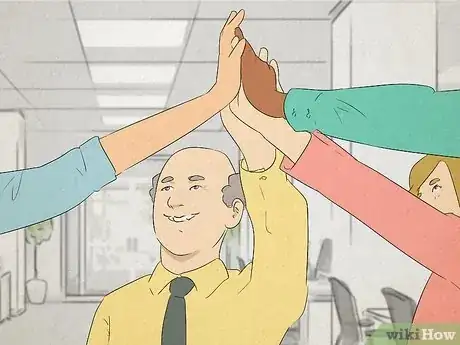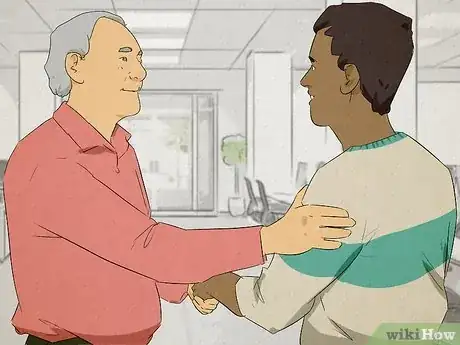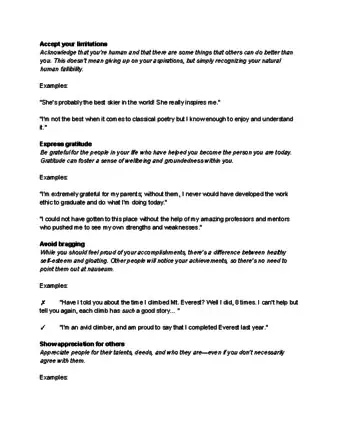This article was co-authored by Taylor Rochestie. Taylor Rochestie is a Professional Basketball Player, Author, and Speaker. Having lived in 12 countries, immersing himself in local cultures and learning about the diversity of life, Taylor offers a unique perspective through his book, "A New 20/20 Vision: Cultivate Joy, Reprogram Your Mind, and Define Life Through an Authentic Lens." He also has over 11 years of professional basketball experience with the Israel Basketball Premier League and the Montenegro men's national basketball team.
wikiHow marks an article as reader-approved once it receives enough positive feedback. This article has 74 testimonials from our readers, earning it our reader-approved status.
This article has been viewed 2,019,105 times.
"It's hard to be humble," says an old country song, "when you're perfect in every way." Of course, few people actually think they're perfect in every way. But it can still be pretty hard to be humble, especially if you live in a society that encourages competition and individuality. Yet even in such a culture, humility remains an important virtue. Learning to be humble is of paramount importance in most spiritual traditions, and humility can help you develop more fully and enjoy richer relationships with others, as well as create opportunities and earn you respect.
Steps
Accepting Your Limitations
-
1Admit that you're not the best at everything -- or anything. No matter how talented you are, there is almost always somebody who can do something better than you. Look to those who are better and consider the potential for improvement. Nobody is the best at something.[1]
- Even if you are 'the best' in the world at doing one thing, there are always other things that you cannot do, and may never be able to do.
- Recognizing your limitations does not mean abandoning your dreams, and it does not mean giving up on learning new things or improving your existing abilities. It simply means acknowledging that, as human beings, none of us are perfect and none of us can do everything by ourselves.
-
2Recognize your own faults. We judge others because it's a lot easier than looking at ourselves. Unfortunately, it's also completely unproductive and, in many cases, harmful. Judging others causes strife in relationships, and it prevents new relationships from forming. Perhaps even worse, it prevents us from trying to improve ourselves. Everybody makes mistakes.[2]
- We make judgments about others all the time, usually without even realizing it. As a practical exercise, try to catch yourself in the act of judging another person or group of people, and whenever you do, judge yourself instead. Consider how you can improve yourself, instead of how you think others should act. After all, you cannot control other people's decisions and behaviors - but you can control yours.
- Work to address your flaws. Remember that growth and improvement is a lifelong process that never stops happening, even when you're very skilled at something.
Advertisement -
3Be grateful for what you have. Suppose you graduate from an Ivy League university at the top of your class. You definitely deserve a lot of credit for the many hours of studying and for your perseverance. Consider though, that there is someone just as intelligent and hardworking as you who had less supportive parents, grew up in a different place, or just made one wrong choice in life. You could be in their position instead.[3]
- Always remember that with a bad choice yesterday, your whole life could be different today and, furthermore, that today could be the day your good choices change your life.
- Though you have undoubtedly worked hard for what you have, you could not have done it all without other people's support. Everything we do is a result of what many other people have done to us. It is all because of the people around us that we get shaped and become better persons at some point so that we could achieve our goals.
-
4Don't be afraid to make mistakes. Part of being humble is understanding that you will make mistakes. Understand this, and understand that everyone else makes mistakes, and you will have a heavy burden lifted off of you. However, this doesn't mean that you should be sloppy - try to avoid obvious mistakes, but don't be afraid to try new methods or ways of accomplishing your goals.[4]
- Each person can only experience a tiny sliver of life at a time. There will always be people who are older and wiser than you. Your elders' opinions could be worth listening to, although you must make the decision based on your knowledge of them.
-
5Admit your mistakes. Although you may fear that people will be angry and frustrated with you, it is always better to admit than to cover it up. Whether you've made a mistake as a boss, parent, or friend, people will appreciate the fact that you're willing to admit that you're not perfect and that you're working to improve yourself and the situation. Admitting your mistakes shows that you're not stubborn, selfish, or unwilling to not look perfect.
- Admitting your mistakes will make people respect you more, whether they are your own children or your coworkers.
-
6Avoid bragging. It's okay to have healthy self-esteem and to feel proud of your accomplishments, but nobody likes it when someone constantly tries to bring attention to themselves and their own achievements. If you feel like you really have done something great, chances are people will have already begun to notice that, and they will come to respect you even more for your humility.[5]
- This doesn't mean you should lie about achieving something; if someone asked if you ran a marathon then it's perfectly acceptable to say 'yes'. But don't constantly talk about how absolutely amazing you were for running the marathon, or achieving other goals.
-
7Be considerate in conversations. Humble people don't have to be meek wallflowers - being humble doesn't mean not having any self-esteem. However, a humble person should be mindful of everyone in the conversation and shouldn't talk down or disrupt anyone. As a humble person, you should recognize that everyone, including you, has their own goals and dreams and they may want to talk about their achievements and their opinions on things.[6]
- Do your best to always be kind to people. You never know what’s happening in someone else’s life, so try asking people what they need rather than focusing on what you want.
-
8Don't take all the credit. We are human beings and who we are now has a lot to do with other people's influence and guidance. Countless people have given you support and helped you to become the person you are so that you can achieve your dreams. It's totally fine to be proud about your achievements, but keep in mind that nobody ever does anything totally by themselves, and that as people, we are all helping each other to accomplish our goals.
- Share the love. Recognize others who have helped you on your path to success.
Appreciating Others
-
1Appreciate the talents and qualities of others. Challenge yourself to look at others and appreciate the things they can do and, more generally, to appreciate people for who they are. Understand that everybody is different and relish the chance you have to experience different people. You will still have your personal tastes, your likes and dislikes, but train yourself to separate your opinions from your fears and you will appreciate others more - you will be more humble as well.[7]
- Being able to appreciate the talents and qualities of others can also help you recognize qualities that you want to improve or obtain yourself.
-
2Stop comparing yourself to others. While competition can be healthy and stimulating, it's nearly impossible to be humble when we're constantly striving to be the "best" or trying to be better than others. Instead, try looking at yourself more. Remember, the ultimate goal isn’t to be better than anyone else, but to be better than the person you used to be. When you focus your energy on improving yourself instead of comparing you to everyone else, you'll find that it is much easier to make yourself better since you don't have to worry about whether or not you're better or worse than anyone.
- Every individual is unique. Appreciate people for who they are as human beings, not for their skills and appearance in relation to yours.
-
3Don't be afraid to defer to others' judgment. Although it is ultimately up to you to decide if you were right or wrong, it is a whole different thing to acknowledge that you make mistakes and that you're not always right. Somewhat more difficult however, is the ability to acknowledge that in many cases other people — even people who disagree with you — may be right. Deferring to your spouse's wishes, to a law you don't agree with, or even, sometimes, to your child's opinion takes your recognition of your limitations to a different level.
- Instead of simply saying you are humble and as a person you will make mistakes, you should also concentrate on living with that mindset - being humble is a way of life, not a one-time action.
-
4Seek guidance from written texts. This is another way of appreciating others. Contemplate moral texts and proverbs about humility. Pray for it, meditate on it, do whatever it takes to get your attention off yourself and your perception of your own worth (especially compared to others). You can read inspiring biographies, memoirs, the Bible, nonfiction and fiction on how to improve your life, or whatever it is that makes you be more humble and appreciate the insight that others have to offer.
- If you're not into spirituality, consider the scientific method. Science requires humility. It requires that you let go of your preconceived notions and judgments and understand that you don't know as much as you think you do.
-
5Remain teachable. Nobody is perfect or the best at anything. There will always be people who are better at you at something, and therein lies the opportunity to learn from them. Find people you aspire to be like in certain areas, and ask them to mentor you. Under mentorship; good boundary setting, confidentiality and discernment are required. As soon as you cross the line of being 'unteachable', bring yourself back down to earth again. Being teachable means that you admit that you always have more to learn about life.
- You can be more humble by taking classes in something you know nothing about, such as pottery or screenwriting, and knowing that you will let others teach you and show you the way. This can help you realize that everyone is good at different things and we all need to help each other in order to become better people.
-
6Help others. A big part of being humble is respecting others, and part of respecting others is helping them. Treat other people as equals and help them because it is the right thing to do. It's been said that when you can help others who cannot possibly help you in return, you have learned humility. Helping people in need will also make you appreciate what you have even more.[8]
- It goes without saying: don't boast about the volunteering you've done. It's great if you're proud of your work but remember: volunteering is not about you, it is about the people you have helped.
-
7Go last. If you're always rushing to get things done first and get to the front of the line, challenge yourself to allow others to go before you - for example, elders, disabled people, children, or people in a hurry.
- Ask yourself, "Do I really need to do this first so badly?" The answer will almost always be no.
-
8Compliment others. Give someone you love, or even someone you barely know, a compliment. Tell your partner that he/she looks great today; compliment your co-worker's new hairdo, or tell the cashier at the grocery store that you like her earrings. Or you can go deeper, and compliment important aspects of people's personalities. Give at least one compliment a day and you will see that other people have so much to offer to the world.
- Focus on the positive attributes of others instead of always looking for their flaws.
-
9Apologize. If you've made a mistake, then confess and admit that you're wrong. Even though saying you're sorry to someone else is painful, you'll have to get over your pride and tell another person that you're sorry for the harm you've done. Eventually the pain will subside, replaced by a feeling of relief because you know that you have made amends. This will show the person that you value him or her greatly and that you acknowledge that you've made a mistake.
- Make eye contact when you apologize to show that you really care.
- Don't be a repeat offender. Apologizing about something does not give you a license to do it again. Doing so will make people distrusting of you and what you say.
-
10Listen more than you talk. This is another great way of appreciating others more and being more humble. The next time you engage in a conversation, let the other person talk, don't interrupt, and ask questions to keep the person talking and sharing. Though you should contribute to the conversation, make a habit of letting others express themselves more than you do so you don't act like you're only concerned with the things that are going on in your life.[9]
- Ask questions to show that you understand what the person is talking about. Don't just wait for the person to stop talking so that you can start talking. Remember, if you're busy thinking about what you want to say, then you'll have a harder time focusing on what they are saying.
Rediscovering a Sense of Wonder
-
1Rejuvenate your sense of wonder. Because we as individuals know very little about the world, you'd expect that we'd be awestruck more often than we typically are. Children have this sense of wonder, and it inspires the curiosity that makes them such keen observers and capable learners. Do you really know how your microwave works? Could you build one on your own? What about your car? Understand your brain? A rose?
- The jaded, "I've seen it all" attitude makes us feel far more important than we are. Nobody has seen it all - nobody knows it all. Be amazed like a child and you will not only be humbled; you will also be readier to learn.
-
2Practice gentleness. The gentleness of spirit is the sure path to humility. Use 'Aikido' where possible when faced with a conflict: absorb the venom from others' attacks and turn it into something positive by trying to understand why they are angry and reacting with gentleness and respect. Practicing gentleness will help you rediscover your sense of wonder as you focus on the positive aspects of life.
-
3Spend more time in nature. Go take a walk in the park. Stand near the bottom of a waterfall. Look at the world from the top of a mountain. Go for a long hike. Swim in an ocean. Find your own way of being in nature and take the time to truly appreciate all that it entails. Close your eyes and feel the breeze on your face. You should feel completely humbled by nature - a force that is so immense in its depth and power. As you develop your wonder and respect for all of the things that were there long before you were and which will be there long after you are gone, you will began to realize just how small you are in this world.
- Spending more time in nature will make you see how big and complicated the world is -- and that you're not at the center of it.
-
4Do yoga. Yoga is the practice of love and gratitude, and it will make you develop your sense of wonder about your breath, your body, and the love and kindness in the world around you. Yoga makes you see how fleeting your time on earth is and to appreciate it even more. Make a habit of practicing yoga at least twice a week and reap all of the emotional benefits as well as the physical ones.
- Yoga is all about being humble. There is no such thing as bragging about how you've hit a new pose in yoga. It's all about doing everything at your own pace.
-
5Spend time around children. Children possess a sense of wonder at the world that is difficult to replicate as an adult. Spend more time around kids and see how they appreciate the world, are constantly questioning it, and how they get pleasure and joy out of the smallest and most mundane things. To a child, a flower or a toilet paper roll can be the most incredible thing in the world -- for an afternoon, anyway.
- Spending more time around children will remind you of how magical the world really is.
Ways to Sound Humble
Warnings
- To be humble isn't the same as being humble, and often people who pretend to be humble do it in order to seek out praise. Other people will recognize this, and even if you fool some, you won't derive the same benefits as you would through actually developing humility.⧼thumbs_response⧽
- Similarly, don't confuse being humble with being sycophantic (being overly-praiseful of someone for your own profit). This is a common misconception, but the two attitudes are completely different.⧼thumbs_response⧽
- While humility is a good thing, don't take it too far, thus becoming a doormat. Remember, everything in moderation. Humility is not a weak trait, it is actually a very strong one in the same way kindness is strong. Standing up for yourself with humility is entirely possible and just takes some practice. Be prepared to need to practice this, and don't be discouraged if you don't get the balance right initially.⧼thumbs_response⧽
References
- ↑ https://www.psychologytoday.com/us/blog/brainsnacks/201501/the-paradoxical-power-humility
- ↑ https://www.researchgate.net/publication/326423192_Humility_and_Emotional_Intelligence
- ↑ https://www.researchgate.net/publication/326423192_Humility_and_Emotional_Intelligence
- ↑ https://www.psychologytoday.com/us/blog/hide-and-seek/201409/should-we-be-humble
- ↑ https://www.researchgate.net/publication/326423192_Humility_and_Emotional_Intelligence
- ↑ https://www.researchgate.net/publication/326423192_Humility_and_Emotional_Intelligence
- ↑ https://www.researchgate.net/publication/326423192_Humility_and_Emotional_Intelligence
- ↑ https://www.psychologytoday.com/us/blog/hide-and-seek/201409/should-we-be-humble
- ↑ https://www.researchgate.net/publication/326423192_Humility_and_Emotional_Intelligence
About This Article
A big part of being humble is recognizing your own limitations. It’s okay to feel proud of your strengths and accomplishments, but at the same time, try to be aware that there is always room to improve and grow. Acknowledge your faults and own up to it when you make a mistake. This doesn’t mean you have to beat yourself up over your mistakes. Instead, look at them as opportunities to learn and do better next time. At the same time, acknowledge the strengths, successes, and contributions of the people around you. Be considerate of others and give them credit for the things they do. When you accomplish something, take time to recognize anyone else who helped you achieve success. Be willing to seek help and advice from others. Even if you don’t necessarily agree with what they have to say, keep an open mind and let them know that you appreciate their perspective. You never know what you might learn from other people if you’re willing to listen.
























































































